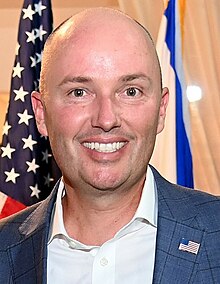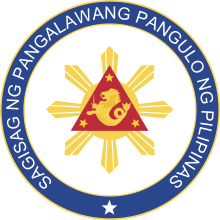Portal:Politics
| Main | Topics and categories | Tasks and projects |
The Politics portal
Politics (from Ancient Greek πολιτικά (politiká) 'affairs of the cities') is the set of activities that are associated with making decisions in groups, or other forms of power relations among individuals, such as the distribution of status or resources. The branch of social science that studies politics and government is referred to as political science.
Politics may be used positively in the context of a "political solution" which is compromising and non-violent, or descriptively as "the art or science of government", but the word often also carries a negative connotation. The concept has been defined in various ways, and different approaches have fundamentally differing views on whether it should be used extensively or in a limited way, empirically or normatively, and on whether conflict or co-operation is more essential to it.
A variety of methods are deployed in politics, which include promoting one's own political views among people, negotiation with other political subjects, making laws, and exercising internal and external force, including warfare against adversaries. Politics is exercised on a wide range of social levels, from clans and tribes of traditional societies, through modern local governments, companies and institutions up to sovereign states, to the international level.
In modern nation states, people often form political parties to represent their ideas. Members of a party often agree to take the same position on many issues and agree to support the same changes to law and the same leaders. An election is usually a competition between different parties.
A political system is a framework which defines acceptable political methods within a society. The history of political thought can be traced back to early antiquity, with seminal works such as Plato's Republic, Aristotle's Politics, Confucius's political manuscripts and Chanakya's Arthashastra. (Full article...)
Selected article
The John Brownlee sex scandal occurred in 1934 in Alberta, Canada, and forced the resignation of Premier John Edward Brownlee. Brownlee was accused of seducing Vivian MacMillan, a family friend and a secretary for Brownlee's attorney-general, in 1930 when she was eighteen years old, and continuing the affair for three years. MacMillan claimed that the married premier had told her that she must have sex with him for his own sake and that of his invalid wife. She had, she testified, relented after physical and emotional pressure. Brownlee called her story a fabrication, and suggested that it was the result of a conspiracy by MacMillan, her would-be fiancé, and several of Brownlee's political opponents in the Alberta Liberal Party. MacMillan and her father sued Brownlee for seduction. After a sensational trial in June 1934, the six man jury found in favour of the plaintiffs, awarding them $10,000 and $5,000, respectively. In an unusual move, trial judge William Ives disregarded the jury's finding and dismissed the case. The Supreme Court of Canada eventually overturned the decision and awarded MacMillan $10,000 in damages. This award was affirmed by the Judicial Committee of the British Privy Council, Canada's highest court of appeal at the time. All of this, however, was largely academic to Brownlee, who resigned after the jury's finding. During the next election, his United Farmers of Alberta were wiped out of the legislature, failing to retain a single seat.
Featured picture

David Ben-Gurion (born David Grün; 16 October 1886 – 1 December 1973) was the primary national founder of the State of Israel and the first Prime Minister of Israel. Adopting the name of Ben-Gurion in 1909, he rose to become the preeminent leader of the Jewish community in British-ruled Mandatory Palestine from 1935 until the establishment of the State of Israel in 1948, which he led until 1963 with a short break in 1954–55.
Selected quote
Selected biography
Phạm Ngọc Thảo (1922–1965), a major provincial leader in South Vietnam and infiltrator of the Army of the Republic of Vietnam (ARVN), was a communist agent of the Viet Minh and later the Vietnam People's Army. As the overseer of Ngô Đình Nhu's Strategic Hamlet Program in the early 1960s, he deliberately forced the program forward at unsustainable speeds, constructing poorly equipped and poorly defended villages, in order to foster rural resentment against the regime of President Ngo Dinh Diem, Nhu's elder brother. Thao was posthumously promoted by the ARVN to the rank of one-star general and awarded the title of Heroic war dead (Vietnamese: Liệt sĩ). After the Fall of Saigon and the end of the Vietnam War, the communist government awarded him the same title and paid war pensions to his family, claiming him as one of their own.
Did you know (auto-generated) -

- ... that before becoming the mayor of Medan, Indonesia, Agus Salim Rangkuti acted in movies and oversaw a real-life political prison camp?
- ... that the First Lady Bake-Off was inspired by a political gaffe by Hillary Clinton and predicted five out of seven elections?
- ... that in 1946, Margrethe Parm was appointed the director of a women's prison that had been used as a political prison during the German occupation of Norway?
- ... that political scientist Selwyn Ryan has been called "the author of record for the ... modern political history" of Trinidad and Tobago?
- ... that the British political theorist Chris Armstrong has called for a "blue new deal" to secure ecological resilience for the ocean and a just blue economy?
- ... that despite entering politics as part of a right-wing party, Betty Tejada was later elected president of the Chamber of Deputies as a member of the Movement for Socialism?
More did you know...
- ...that the Japanese Farmer-Labour Party was banned just a few hours after its foundation in 1925?
- ...that Glenn Beck introduced a "Black-Robed Regiment" of pastors from various denominations during his Restoring Honor rally in 2010, and launched a news website called The Blaze three days later?
- ...that the book Targeted Killing in International Law argues support in the Western world for targeted killing increased following the September 11 attacks?
- ...that Mussolini's Quota 90 fixed the lira exchange rate against the pound sterling at the prevailing rate from five years earlier, when he assumed power?
- ...that the energy lobby contributed 19 million dollars to United States political campaigns in the 2006 election cycle?
- ...that the lifelong Democrat Jim Naugle is in his sixth straight term as the Mayor of Fort Lauderdale and supported only Republicans for President since 1968?
- ...that the Brown Dog affair, an Edwardian era vivisection controversy, led to massive riots?
- ...that the Second Malaysia Plan sought to restructure the socioeconomic state of Malaysia through aggressive affirmative action?
In this month
- November 4, 1980 – Ronald Reagan defeats Jimmy Carter in the presidential election and becomes the 40th President of the United States.
- November 4, 2008 – Barack Obama was elected as the 44th President of the United States, becoming the first African American elected to the office. Congressional elections for the House of Representatives and one third of the Senators (second class) were also held.
- November 7, 2000 – Hillary Rodham Clinton is elected to the United States Senate, becoming the first First Lady of the United States to win public office.
- November 7, 1917 – The workers of the Petrograd Soviet in Russia, led by the Bolshevik Party and leader Vladimir Lenin, storm the Winter Palace and successfully destroy the Kerensky Provisional Government, resulting in the first overthrow of capitalism in history.
- November 11, 2004 – Former Palestinian President Yasser Arafat dies from a mysterious illness, aged 75.
- November 21, 2004 – Ukrainian presidential election, 2004: Viktor Yanukovych is declared the winner in the final round. International election observers express severe criticism, and large crowds gather in a protest rally in Kiev; 12 days later, the Supreme Court annuls the result, and a new poll is scheduled.
- November 22, – In Dallas, Texas, United States President John F. Kennedy is assassinated, Texas Governor John B. Connally is seriously wounded, and Vice President Lyndon Baines Johnson becomes the 36th President. All television coverage for the next four days is devoted to the assassination, its aftermath, the procession of the horsedrawn casket to the Capitol Rotunda, and the funeral of President Kennedy. Stores and businesses shut down for the entire weekend and Monday, in tribute.
News and Current events
- August 11: 4 local government areas in New South Wales, Australia locked down after COVID-19 case
- August 11: Australia: AstraZeneca vaccine access expanded by Victorian government
- August 1: Australia: Victorian lockdown lifted
- July 29: Tunisia's president dismisses prime minister, suspends parliament
- July 25: Australia: Wikinews interviews Reg Kidd, mayor of the City of Orange, about COVID-19 lockdown and local government
- July 23: South Australia enters week-long lockdown to contain COVID-19 Delta variant spread
- July 21: Technological University Dublin senior lecturer Dr Lorcan Sirr speaks to Wikinews on housing market in Ireland
- July 21: Three rural councils in New South Wales, Australia enter 7-day lockdown
- July 21: Australia: Victoria lockdown extended by a week with 85 active cases recorded
- July 15: California governor signs new state budget, eligible Californians to get stimulus payments
Topics and categories
General images
Related portals
Associated Wikimedia
The following Wikimedia Foundation sister projects provide more on this subject:
-
Commons
Free media repository -
Wikibooks
Free textbooks and manuals -
Wikidata
Free knowledge base -
Wikinews
Free-content news -
Wikiquote
Collection of quotations -
Wikisource
Free-content library -
Wikiversity
Free learning tools -
Wiktionary
Dictionary and thesaurus

























































